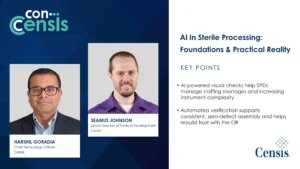How Physicians Can Overcome Telemedicine Limitations
The challenges healthcare executives and administrators face are constantly changing. Host Kevin Stevenson talks with the heroes behind the heroes that are enabling hospitals, urgent care centers and telemedicine operators to spend their time tending to patients, while they handle the logistics.
While there have been many downsides to the unexpected changes we all needed to make in 2020, there were also improvements made to how we work and live. The upsurge in telemedicine is an example of such progress made in the face of adversity. On the latest episode of I Don’t Care, host Kevin Stevenson spoke with Dr. Adam Saltman, Chief Medical Officer, Eko about the integration of telemedicine with digital technology and AI.
Telemedicine can allow for more convenient access to care and can help keep patients and health care providers safe. That being said, there are some crucial missing components that can limit the quality of patient care. For example, physicians cannot listen to their patients’ bodies on their own via video conference. Really listening to the patient’s heart, lungs, and bowel sounds through a stethoscope can typically only happen face to face. Eko closes this divide between physicians and patients with their digital stethoscopes, which transmit high fidelity sounds to remote physicians in real time as if they were at the bedside. In addition, Eko AI analysis algorithms help physicians screen for AFib and heart murmurs.
According to Dr. Saltman, if they have the right technology available to them, physicians can overcome the distance based challenges of telemedicine. “When I listened to physicians say things like, ‘Well, I don’t think a Zoom call is a really good physical exam,’ they’re right. It’s not a good physical exam,” Dr. Saltman said. However, he feels that if he can give them an EKG and therefore can give them heart sounds, lung sounds, bowel sounds, and whatever else they want to listen to, they can make telemedicine work. “Combined with that video, now they feel a lot more comfortable. They’re getting a real medical evaluation. And the patients too, they feel that, wow my doctor actually listened to me even though I’m far away,” Dr. Saltman explained.










